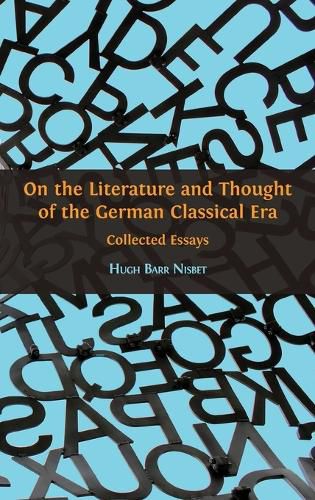Readings Newsletter
Become a Readings Member to make your shopping experience even easier.
Sign in or sign up for free!
You’re not far away from qualifying for FREE standard shipping within Australia
You’ve qualified for FREE standard shipping within Australia
The cart is loading…






This title is printed to order. This book may have been self-published. If so, we cannot guarantee the quality of the content. In the main most books will have gone through the editing process however some may not. We therefore suggest that you be aware of this before ordering this book. If in doubt check either the author or publisher’s details as we are unable to accept any returns unless they are faulty. Please contact us if you have any questions.
This elegant collection of essays ranges across eighteenth and nineteenth-century thought, covering philosophy, science, literature and religion in the ‘Age of Goethe.’ A recognised authority in the field, Nisbet grapples with the major voices of the Enlightenment and gives pride of place to the figures of Lessing, Herder, Goethe and Schiller.
These eleven essays range widely in their compass of thought and intellectual discourse, dealing incisively with themes including the philosophical implications of literature and the relationship between religion, science and politics. The result is an accomplished reflection on German thought, but also on its rebirth, as Nisbet argues for the relevance of these Enlightenment thinkers for the readers of today.
The first half of this collection focuses predominantly on eighteenth-century thought, where names like Lessing, Goethe and Herder, but also Locke and Voltaire, feature. The second has a wider chronological scope, discussing authors such as Winckelmann and Schiller, while branching out from discussions of religion, philosophy and literature to explore the sciences. Issues of biology, early environmentalism, and natural history also form part of this volume. The collection concludes with an examination of changing attitudes towards art in the aftermath of the ‘Age of Goethe.’
The essays in this volume have been previously published separately, but are brought together in this collection to present Nisbet’s widely-acclaimed perspectives on this fascinating period of German thought. It will be of interest to scholars and students of the intellectual life of Europe during the Enlightenment, while its engaging and lucid style will also appeal to the general reader.
$9.00 standard shipping within Australia
FREE standard shipping within Australia for orders over $100.00
Express & International shipping calculated at checkout
This title is printed to order. This book may have been self-published. If so, we cannot guarantee the quality of the content. In the main most books will have gone through the editing process however some may not. We therefore suggest that you be aware of this before ordering this book. If in doubt check either the author or publisher’s details as we are unable to accept any returns unless they are faulty. Please contact us if you have any questions.
This elegant collection of essays ranges across eighteenth and nineteenth-century thought, covering philosophy, science, literature and religion in the ‘Age of Goethe.’ A recognised authority in the field, Nisbet grapples with the major voices of the Enlightenment and gives pride of place to the figures of Lessing, Herder, Goethe and Schiller.
These eleven essays range widely in their compass of thought and intellectual discourse, dealing incisively with themes including the philosophical implications of literature and the relationship between religion, science and politics. The result is an accomplished reflection on German thought, but also on its rebirth, as Nisbet argues for the relevance of these Enlightenment thinkers for the readers of today.
The first half of this collection focuses predominantly on eighteenth-century thought, where names like Lessing, Goethe and Herder, but also Locke and Voltaire, feature. The second has a wider chronological scope, discussing authors such as Winckelmann and Schiller, while branching out from discussions of religion, philosophy and literature to explore the sciences. Issues of biology, early environmentalism, and natural history also form part of this volume. The collection concludes with an examination of changing attitudes towards art in the aftermath of the ‘Age of Goethe.’
The essays in this volume have been previously published separately, but are brought together in this collection to present Nisbet’s widely-acclaimed perspectives on this fascinating period of German thought. It will be of interest to scholars and students of the intellectual life of Europe during the Enlightenment, while its engaging and lucid style will also appeal to the general reader.